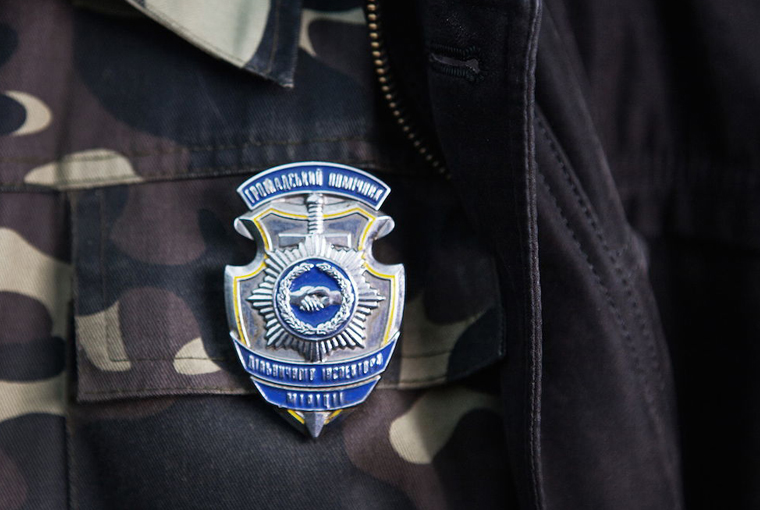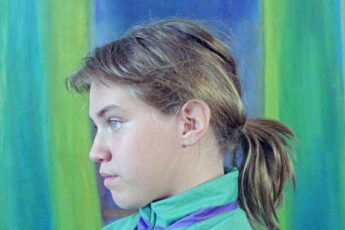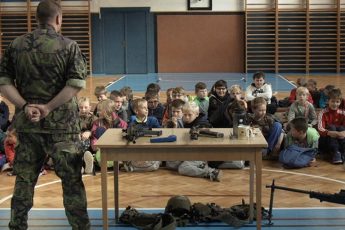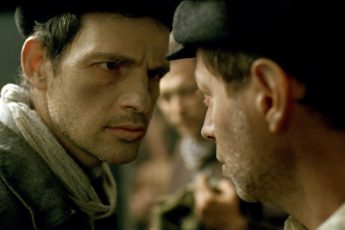Two Old Coppers in Ukraine
Roman Bondarchuk’s Ukrainian Sheriffs (2015)
Vol. 92 (February 2019) by Daniel Fuller
Come down with me, then, to Ukraine – a young nation now missing a the before it, but very much still the border which is its namesake. Follow, then, two men – one old and wizened and the other less so, who have been deputized by the Mayor to maintain some semblance of order in the village of Stara Zburjivka. The Police are ‘so far away’ and this is a place where society holds itself together, the state a dreamy impression, a half-remembered thought.
Stara Zburjivka is itself a border in many senses. Firstly it is a border between two historical moments. The old Soviet dialectic of utopian progress has there been shattered, and destitution wrought in its stead. This gives the place a purgatorial quality, a sense of being out of time and within it. A place in a liminal twilight. Tumble-down houses litter its unpaved streets. Sheriffs Viktor and Volodya patrol their domain in a tired old Lada, painted Ukrainian yellow and with a (perhaps) Chinese-made flag fluttering tentatively from the rooftop. Its people are the tired, the alcoholic, the destitute – a proletariat reduced to a lumpen state, if they had ever truly ceased to be the muzhiks of old. Modernity does arch its neck upon occasion, as when a landlady arrives complaining about an alcoholic tenant who has installed several snakes in her back yard.
“I was hoping you would not mention the anaconda. What a day.”
From the beginning the work of the two men is entangled with these sad souls (not dead yet), most notably the chimerical, wife-beating alcoholic who nonetheless retains a kind of glamour about him – as if he has awoken, bleary-eyed, from a centuries long sleep and is only pretending to be of our time. The sheriffs’ attempt to bring Kolya back into the arms of civic society, overseeing his return to his family home vacated by his dead brother. The place is threadbare, its walls with no ornamentation and the presence of electricity worthy of exclamation. There they find an old black and white photo of the unfortunate Kolya, dressed immaculately for a camp.
“He was a fine young pioneer, once”, Viktor exhales wistfully.
The film is a series of vignettes with minimal explanation. Details are intentionally left obscure to create a portrait of a village that is uneven and indistinct. Mysteries come into the foreground, only to be forgotten, unremarked. When the sheriffs discover the grisly scene of a dead, unnamed alcoholic covered in blood and missing teeth, they are singularly unsurprised. Any detail will be difficult to pin down – his lifestyle estranged him from the body social, half-dead even when he breathed. The last we hear of this unsolved disappearance is a sombre scene in which the Sheriffs dig a grave for the unnamed soul amidst heavy snow. One wonders if his killer will ever be found, if the murderer even recalls the deed.
The new era arrives at a creep at first. It announces itself through old Soviet radios that crackle with age, through black-and-white TVs ephemeral through faint signals. Portents of war that seem themselves a dream, grainy and unreal. A silent watchman listens to the radio in scenes throughout the war, garbed in a string vest reminiscent of Soviet sailors. He radios an unseen compatriot, the refrain ‘nothing to see here’ as he looks over the endless Ukrainian steppe.
But there is something to see. The news arrives, as a trickle. Nearby Crimea has been annexed. Donetsk and Lugansk are rising in revolt. The draft has been instituted. This, then, places Stara Zburjivka as a border that is real. History has asserted itself. A revanchist Russia looms over the border, and little green men might lurk in the undergrowth. Within the village supporters of the annexation seek to galvanize the public by an attempt to create a parallel government, which is met by angry remonstration from the Mayor and the villagers. The Sheriffs, perhaps wearily, begin to chase draft dodgers.
By the end of the film, locals pose with their young fighters due for the frontlines. Viktor’s teenage grandson is garbed in military fatigues and given a rifle to hold. Meanwhile, Volodya mourns the removal of the alcoholic Kolya to prison. He had been caught fleecing a stolen bicycle, and sent to prison for three-and-a-half years.




Leave a Comment